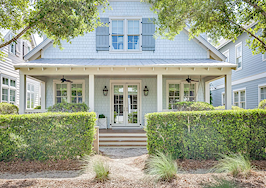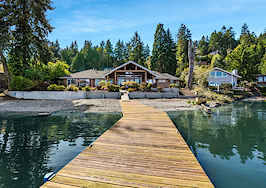Join the exceptional and become a Sotheby's International Realty agent.
Learn More
In luxury real estate, prospective clients have always had exacting requests. In recent years, not only have their wish lists become more specific, but the overwhelming majority of property searches begin with online listings long before buyers ever engage with a seller or an agent.
How can you capture their attention at this early stage so your listing stands out? Make sure to mention the qualities that matter most to this affluent audience.
This doesn’t have to be a rigorous or technical process. “Most of my data is from in-person networking, talking to agents, or talking to buyers,” says Susan Schall, Real Estate Associate at Venture Sotheby’s International Realty.
Samuel Wilson, Real Estate Professional with Sotheby’s International Realty – Cape Cod Brokerage, agrees. “I collect most of my keyword insights via conversations with other agents and prospective buyers,” he says.
Through these relationships and exchanges of information with colleagues and clients, Schall and Wilson have seen patterns emerge — patterns that they can savvily incorporate, if relevant, when listing new properties.
5 terms that homebuyers frequently search
Susan Schall
1. Name the specific neighborhood: Though smaller than a town or a village, many residential areas are known by distinct monikers or epithets. In Wilson’s Cape Cod market, which is steeped in history, these have existed for generations and garner great interest. “For example, buyers want to know if a property is within the Hyannis Port Civic Association, which brings additional amenities in the form of beaches and yacht clubs,” says Wilson.
2. Emphasize the property’s privacy: Now more than ever before, buyers want peace and space. “Privacy is the biggest request I get when buyers are searching homes in luxury communities,” says Schall.
3. Note the home’s swimming pool: Another trend seeing increased traction is the swimming pool, — though in some markets, such as Schall’s, this isn’t new. “In the luxury category, a pool is almost a requirement — or at least a lot that can accommodate one,” she says. “This has been consistent throughout my 16 years in Pleasanton, California.”
4. Mention parking or garage space: Newer than the need for a pool is the ability of a property to accommodate car collections. “I’m getting more requests for homes with large garage spaces in the luxury category,” says Schall.
5. Be clear about the school district: “I think it’s important to note which school district the house is assigned to,” she adds. “In our area, the internet is often wrong and some prospects will skip over a home because they believe, incorrectly, that the house goes to the neighboring city’s schools. I often note, ‘award-winning Pleasanton Schools.’”
4 additional factors agents should consider
Samuel Wilson
1. Separate dwellings: The guest cottage appears to be gaining popularity, as many buyers may have family or domestic help moving onto their property in the short- or long-term — but bear in mind that buyers might use different terms when scanning for it.
2. Rental opportunities: “We are getting more questions about summer rentals and Airbnb, especially with the ever-changing ‘sandbars’ of local regulations and taxes,” notes Wilson. “Therefore, we are very careful to properly present rental opportunities for prospective buyers.”
3. Gated communities: For a range of reasons, public safety is top-of-mind for many, and the concept of a gated neighborhood holds appeal. Schall sees this conspicuously among out-of-town buyers, with many former residents of Silicon Valley relocating to Pleasanton.
4. Recreation access: Buyers want readily available activities close by, either for them or for their children. Schall started noticing this trend when more people in her area began searching for golf access.
3 ways that agents should exercise caution
Along with capitalizing on the terms that will pique a prospect’s curiosity, here are a few other pieces of advice that Wilson and Schall share with their fellow agents:
“With many homes being over a hundred years old, we’re careful to present older, less-updated homes as opportunities for buyers to make their own history at the property,” says Wilson. “We avoid terms such as ‘investor’, ‘fixer-upper’, or ‘handyman special’.”
Choose descriptors that are on-brand for the high-end real estate market — for example, exceptional rather than great. “Read luxury listings from other upscale areas, and model text after some of those listings,” suggests Schall.
While sometimes agents tap into a particular zeitgeist — for instance, buyers in some markets may be looking for homes that are “modern” — Wilson discourages chasing fad words. “Luxury buyers are smarter than that,” he says. “Be truthful but optimistic about the property.”
And remember that keywords are just one piece of the puzzle. “Luxury is a small category and inventory is low, so searches tend to be in price ranges rather than specific features,” explains Schall. But by being specific around the features clients favor, agents can help to expedite their search and find their dream home faster and easier.
Experience the latest from Sotheby’s International Realty on Instagram, Facebook, Twitter, Linkedin, YouTube, and now on TikTok.














